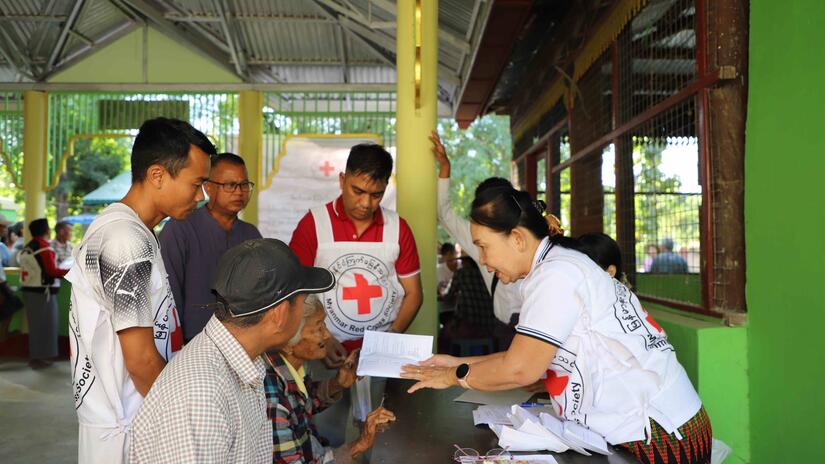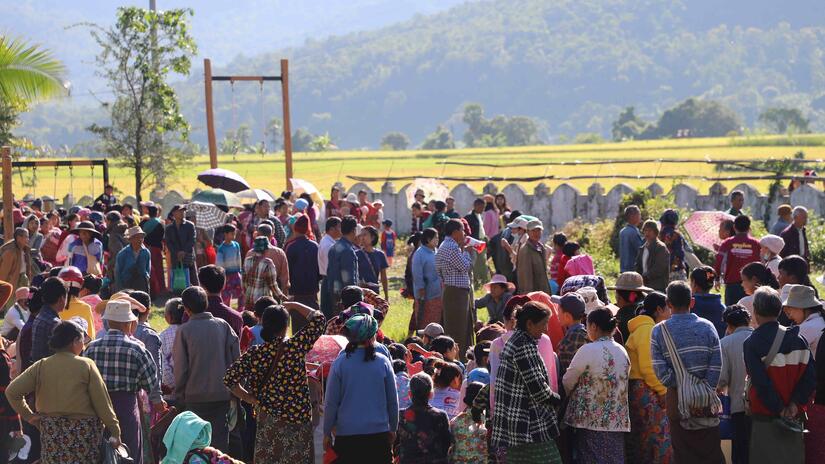Dr. Chaw Khin was only in fifth grade when she took part in first aid training sponsored by the Myanmar Red Cross Society, laying the foundation for a lifelong dedication to the Fundamental Principles of the International Red Cross and Red Crescent Movement.
Later, during her university years, she began actively engaging in Red Cross activities within her community.
Now, aged 66, Dr. Chaw serves as the chair of the Magway Region Red Cross Supervisory Committee. Her transparent approach and emphasis on the Fundamental Principles has paved the way for effective response in a time of uncertainty and recurring crises.
In February 2021, the political and humanitarian landscape drastically changed in Myanmar. Already dealing with the continued impact of COVID-19 and harsh economic conditions, the Magway Region was then affected by clashes between various factions, leading to the displacement of thousands of people.
Undeterred, Dr. Chaw navigated the complex environment, conducting dissemination sessions on humanitarian principles in order to build trust with people affected by these crises, as well as all other groups, organizations and agencies involved.
A critical foundation, says Dr. Chaw, has been the principle of Independence, which means the Red Cross only focuses on its mandate to help people in need and is not part of any particular group’s agenda.
“It’s important to continuously promote and emphasize the independence of the Myanmar Red Cross in all and any form of engagement with all partners, whether formal or informal,” Dr. Chaw says.
This is particularly important when various sectors of the community do not trust each other. “Advocacy to local authorities and community has led to increased acceptance in most of the Magway region, but some areas still experience hatred between different sides in the conflict,” she says.
That distrust and division is one reason that ACAPS, an organization that seeks to help humanitarians make informed decisions, has categorized Myanmar as one of five countries globally in “extremely severe constraints" in terms of humanitarian access.
Those difficulties also affect the Myanmar Red Cross, and this is why Dr. Chaw’s transparent and persistent negotiations and dialogue with numerous groups and communities are so important.

Dr. Chaw Khin talks with people impacted by Cyclone Mocha in 2023 during a cash distribution aimed at helping them get back on their feet after the storm.
Photo: Myanmar Red Cross Society
Supporting the volunteers
As Myanmar Red Cross volunteers are part of the communities they serve, this unrest and upheaval affected them too. Many were displaced from their townships. Dr. Khin made it a priority to keep in touch with her volunteers and ensure they were given as much support as possible.
The maintenance of volunteer registration cards, a process she diligently oversaw as a leader, ensured continued support for the volunteers, even in new and challenging circumstances.

People gather to receive assistance from the Myanmar Red Cross in the Magway region of Myanmar.
Photo: Myanmar Red Cross Society
From pandemic to storms
The true impact of Dr. Chaw 's leadership unfolded during relief distributions to vulnerable communities. During the pandemic, she served as chair of the COVID-19 Response Committee in Magway Region. In that role, she helped establish strong community relationships and gained the trust of local authorities.
In May 2023, Cyclone Mocha – tied with 2019’s Cyclone Fani as the strongest ever recorded in the north Indian Ocean - wreaked havoc in the western and northwestern parts of Myanmar, bringing new misery to struggling communities.
During all these challenges, Dr. Chaw played a crucial role in ensuring equitable community access to health, water, sanitation, and education services.
Humbled by her experiences, she is full of praise for the Myanmar Red Cross Society and the volunteers of the Magway Red Cross branch, for everything they do to keep humanity alive.
By Swe Zin Myo Win
Photos: Khaing Wai Aung and Htun Kyaw, Myanmar Red Cross Society





